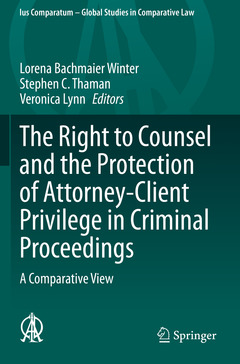Description
The Right to Counsel and the Protection of Attorney-Client Privilege in Criminal Proceedings, 1st ed. 2020
A Comparative View
Ius Comparatum - Global Studies in Comparative Law Series, Vol. 44
Language: English
Subject for The Right to Counsel and the Protection of...:
Publication date: 06-2021
440 p. · 15.5x23.5 cm · Paperback
Publication date: 06-2020
440 p. · 15.5x23.5 cm · Hardback
Description
/li>Contents
/li>Biography
/li>Comment
/li>
The book provides an overview of the right to counsel and the attorney-client privilege in the following 12 jurisdictions: China, Germany, Greece, Italy, Japan, the Netherlands, Portugal, Spain, Switzerland, Turkey, UK and USA.
The right to counsel is a fundamental right providing the accused access to justice in criminal proceedings. Lawyers can only practice their profession properly if clients have complete trust in their lawyer?s discretion. This trust is safeguarded by the attorney-client privilege, which is an indispensable part of every constitutional state and one of the most important professional duties of a lawyer. It is of particular importance in criminal proceedings regarding the protection of the confidentiality of lawyer-client communications in the different procedural stages, coercive measures as well as the various duties and interests in play. However, the communications protected by attorney-client privilege vary greatly from country to country. With regard to criminal investigations in an increasingly globalised world, where sophisticated tools enable broad digital investigations, there is an urgent need to clarify how this fundamental right is protected at both the national and supranational level.
Each chapter explores the regulations, practices and recent developments in each jurisdiction and was written by highly qualified experts in the legal field ? from academia and practice alike. It identifies possible solutions and best practices, providing valuable insights for practitioners and law-making bodies alike regarding the actual protection (or lack thereof) of lawyer-client confidentiality in the pretrial and trial stage of criminal proceedings.
Addresses the confidentiality of attorney-client communications as a fair trial right in criminal proceedings
Analyses the right to confidential communications
Pursues a comparative approach




